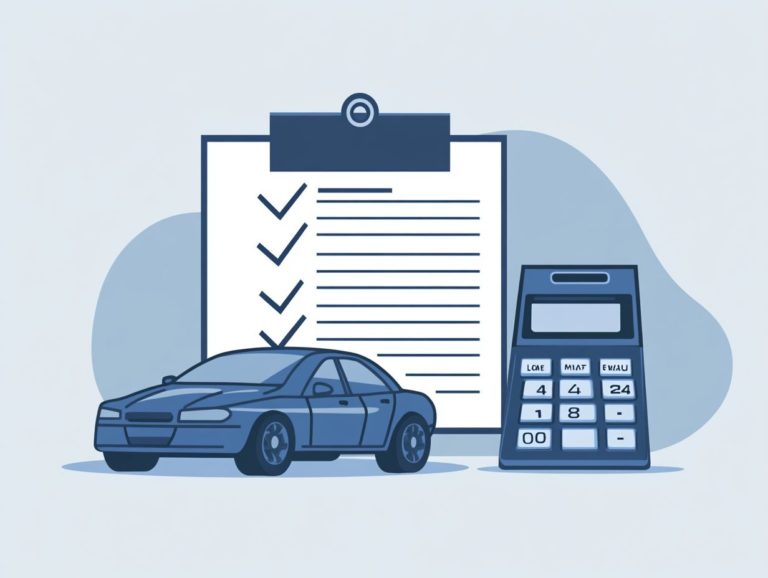Understanding the Total Cost of Car Ownership
Owning a car may seem like a straightforward investment, but the reality can surprise you. Beyond that initial sticker price, the total cost of ownership includes various hidden expenses that can catch even the most astute buyers off guard.
Consider depreciation, maintenance, insurance, and registration fees. These factors can accumulate faster than you might expect. Let s uncover the true costs of car ownership now, providing you with insights on how to anticipate, budget for, and minimize those expenses.
Explore how to make informed decisions that can save you money in the long run.
Contents
- Key Takeaways:
- The Hidden Costs of Car Ownership
- Unlocking the Secrets of Total Car Costs
- Understanding Depreciation
- Costs of Maintenance and Repairs
- Insurance and Registration Costs
- Tips for Minimizing Total Cost of Car Ownership
- Frequently Asked Questions
- What is meant by “Total Cost of Car Ownership”?
- Why is it important to understand the Total Cost of Car Ownership?
- What are some common expenses included in the Total Cost of Car Ownership?
- How does the type of car affect the Total Cost of Car Ownership?
- Can I estimate the total car ownership costs before purchasing a car?
- How can I lower the total car ownership costs?
Key Takeaways:
Understanding the true costs of car ownership is crucial. Here are some key points:
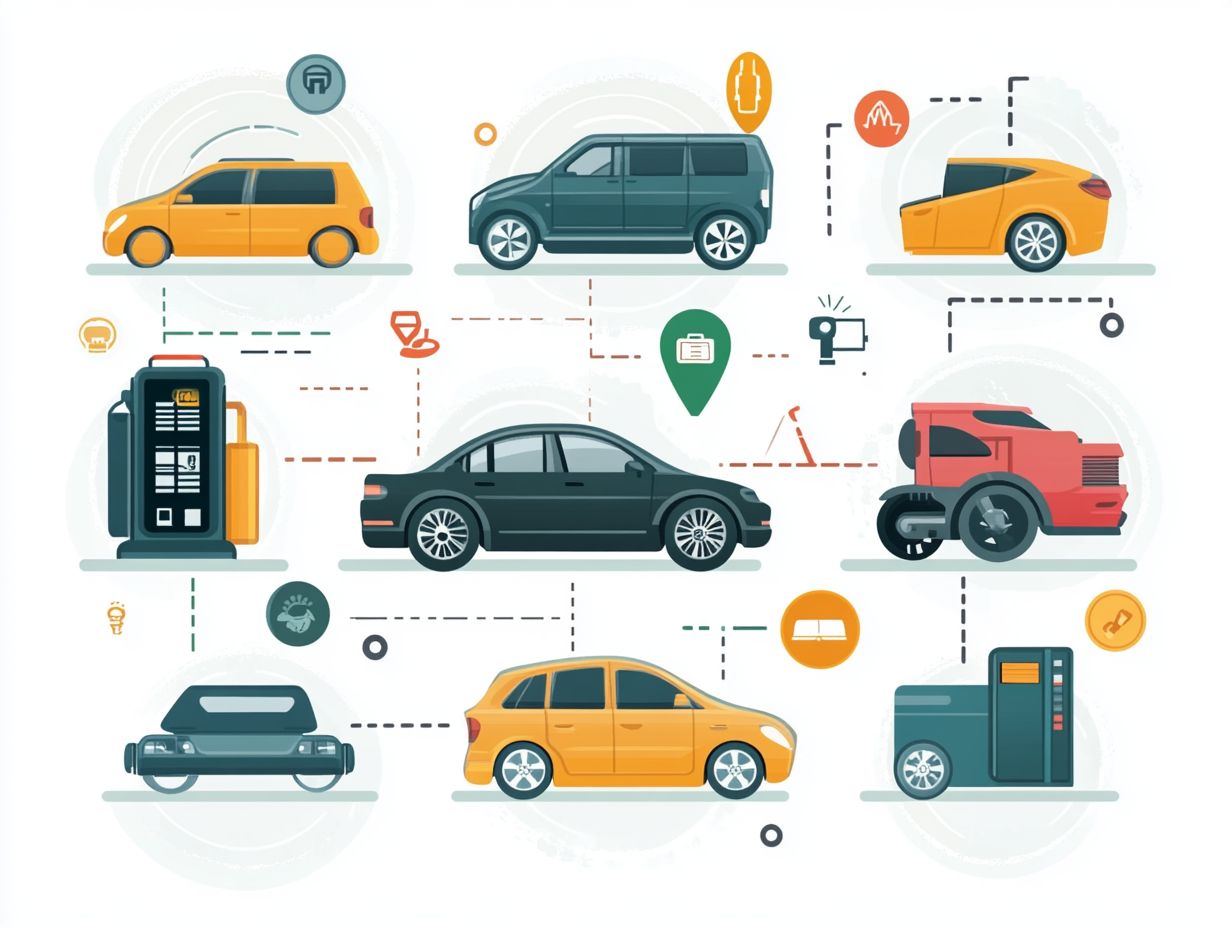
- The sticker price is only a fraction of the total cost of owning a car.
- Additional expenses such as maintenance, insurance, and registration fees can significantly add up.
- Factors such as fuel efficiency, resale value, and repair costs should be considered when calculating the total cost of car ownership.
- Depreciation, meaning the decrease in a car’s value over time, is a major factor in the total cost of ownership.
- Proper maintenance and repairs can help minimize depreciation costs.
The Hidden Costs of Car Ownership
Car ownership involves many hidden costs that extend well beyond the initial price of the vehicle. While you might focus on financing options or the sticker price of popular models like the Toyota Corolla or Kia Forte, it s easy to overlook other significant expenses.
Maintenance costs, insurance premiums, fuel expenditures, and depreciation all play crucial roles in determining the total cost of ownership. Considering the average annual cost of owning a personal vehicle can be substantial, especially in areas with varying median household incomes, such as New York City and Jacksonville.
Understanding these hidden costs is vital for effective financial planning.
Beyond the Sticker Price
The sticker price can be misleading. Various additional expenses emerge throughout the vehicle’s life.
For example, financing a sedan like the Honda Accord, which has an appealing base price, can lead to escalating costs. When you factor in monthly payments and fluctuating interest rates influenced by your credit score, the total cost can rise dramatically.
Depreciation also affects resale value; on average, a vehicle loses about 20% of its worth in the first year alone. This means that even a car with a modest price tag can end up costing significantly more over time than you initially expected.
Recurring expenses like insurance premiums, ranging from $1,000 to $2,500 annually depending on the model and your driving history, along with fuel costs, can add up quickly.
For instance, while the Toyota Camry is known for its economical benefits, it still incurs regular expenses such as maintenance and fuel, illustrating that the true cost of ownership often extends far beyond the initial sticker price.
Unlocking the Secrets of Total Car Costs
Calculating the total cost of ownership (TCO) for a vehicle is essential for you as a prospective buyer. This comprehensive assessment captures all expenses you will incur throughout the vehicle’s lifespan, providing a clearer picture of your financial expectations.
It includes various elements such as financing costs think monthly payments, insurance premiums, maintenance expenses, and the depreciation rates specific to models like the Subaru Outback or Nissan Rogue.
By understanding these components, you can make informed decisions that align perfectly with your budget and financial planning objectives.
Take a moment now to calculate your potential expenses and make smarter choices!
Factors to Consider
When calculating the total cost of car ownership, several critical factors demand your attention. These costs go beyond just the sticker price and can significantly impact your budget over time.
Take financing costs, for example. They can vary wildly based on your credit score and loan terms. Higher interest rates can dramatically inflate your monthly payments.
Maintenance is another key consideration. Owning a luxury vehicle like a BMW might lead to steeper repair bills, while a Honda typically offers a more budget-friendly upkeep experience.
Insurance premiums vary based on your vehicle s make and model. Sports cars often attract higher rates than family sedans.
Don’t forget fuel expenses. These can shift based on gas prices and your car’s fuel efficiency. Hybrids usually excel in this area, offering potential savings.
Depreciation is also crucial in this financial equation. Some cars, like a Tesla, retain their value better than others. By being aware of these factors, you can plan your finances more effectively and make informed decisions about your car ownership journey.
Understanding Depreciation
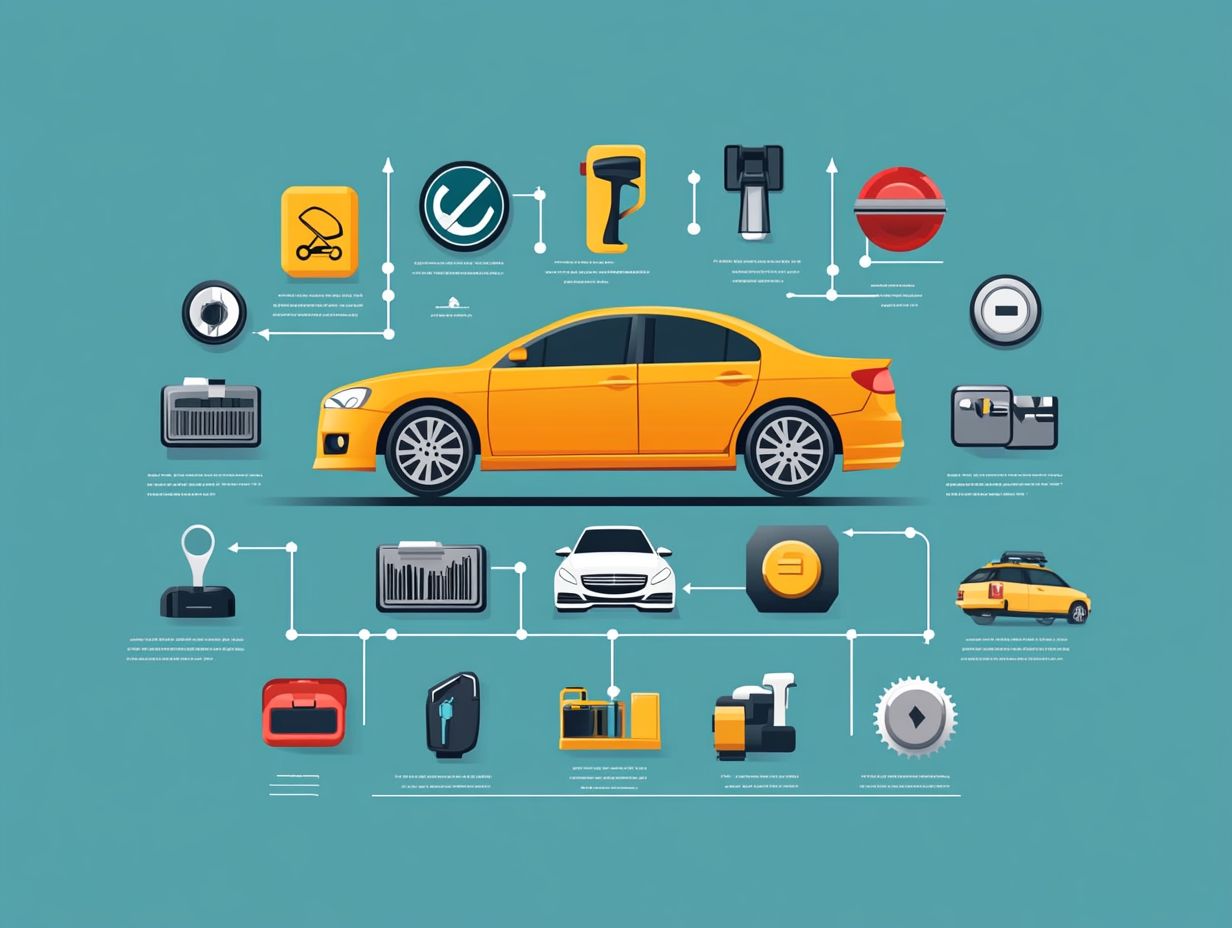
Understanding depreciation is essential for car owners. It signifies the decline in your car’s value over time, greatly affecting the total cost of ownership.
Different vehicles, such as the Kia Soul and Toyota Highlander, depreciate at varying rates. This can affect how much you can expect to receive when selling or trading in your car.
This loss in value is often intensified by factors like mileage and condition. Understanding depreciation is key for your financial planning regarding personal vehicles.
By grasping the mechanics of depreciation, you can make informed decisions regarding your car investments.
How it Affects the Total Cost
Depreciation significantly influences the total cost of car ownership. It dictates how much value your vehicle loses over time, ultimately impacting its potential resale price.
As cars age, their market value generally declines. This leads to substantial financial implications when deciding to sell or trade in your vehicle.
Understanding depreciation gives you insights into your ownership experience. Low resale values can limit your profits and complicate your budget.
To minimize losses, consider selecting models known for their reliability and lower depreciation rates, such as certain sedans and SUVs that tend to hold their value well.
Mileage, maintenance history, and even the vehicle’s color can influence resale value. These considerations are critical for effective financial planning in your vehicle ownership journey.
Costs of Maintenance and Repairs
The costs of maintenance and repairs are essential factors in car ownership that can easily catch buyers off-guard. These expenses can add significantly to your overall financial burden.
Regular maintenance expenses like oil changes, tire rotations, and brake inspections can add up over time. They vary depending on the vehicle’s make and model. For example, a Toyota Corolla may have different service needs compared to a Nissan Rogue, impacting long-term ownership costs.
Understanding these expenses related to maintenance and repairs is crucial. Effective financial planning ensures your car remains in peak condition for years to come.
Anticipating and Budgeting for Expenses
Anticipating and budgeting for maintenance costs and repairs is essential for avoiding unexpected financial strain as a car owner. By planning ahead, you can allocate the right funds each month for upkeep.
Begin by crafting a detailed list of regular maintenance tasks, such as oil changes and tire rotations. Research their average costs. Setting aside a modest amount each month can prepare you for that inevitable brake replacement down the road.
Proactive maintenance extends the life of your vehicle and reduces costly emergency repairs. Neglecting routine checks can lead to significant consequences. A minor fluid leak you ignore could snowball into complete engine failure, leaving you with exorbitant repair bills.
Recognize that the benefits of a well-maintained car far outweigh the costs involved. Investing in your vehicle today means safeguarding your wallet tomorrow.
Don’t let unexpected costs surprise you! Start budgeting today to take control of your car ownership costs!
Insurance and Registration Costs
Insurance and registration costs are key aspects of car ownership, typically making up a significant portion of your ongoing expenses. It’s essential to consider these in your financial planning.
The fees for registering your vehicle can vary considerably depending on your state and the model you choose. Insurance premiums may shift based on factors such as your credit score, driving history, and the specific type of vehicle, whether it’s a Kia Sorento or a Toyota Highlander.
Understanding these insurance and registration costs helps you budget better and manage your ownership expenses effectively.
Factors that Influence Rates
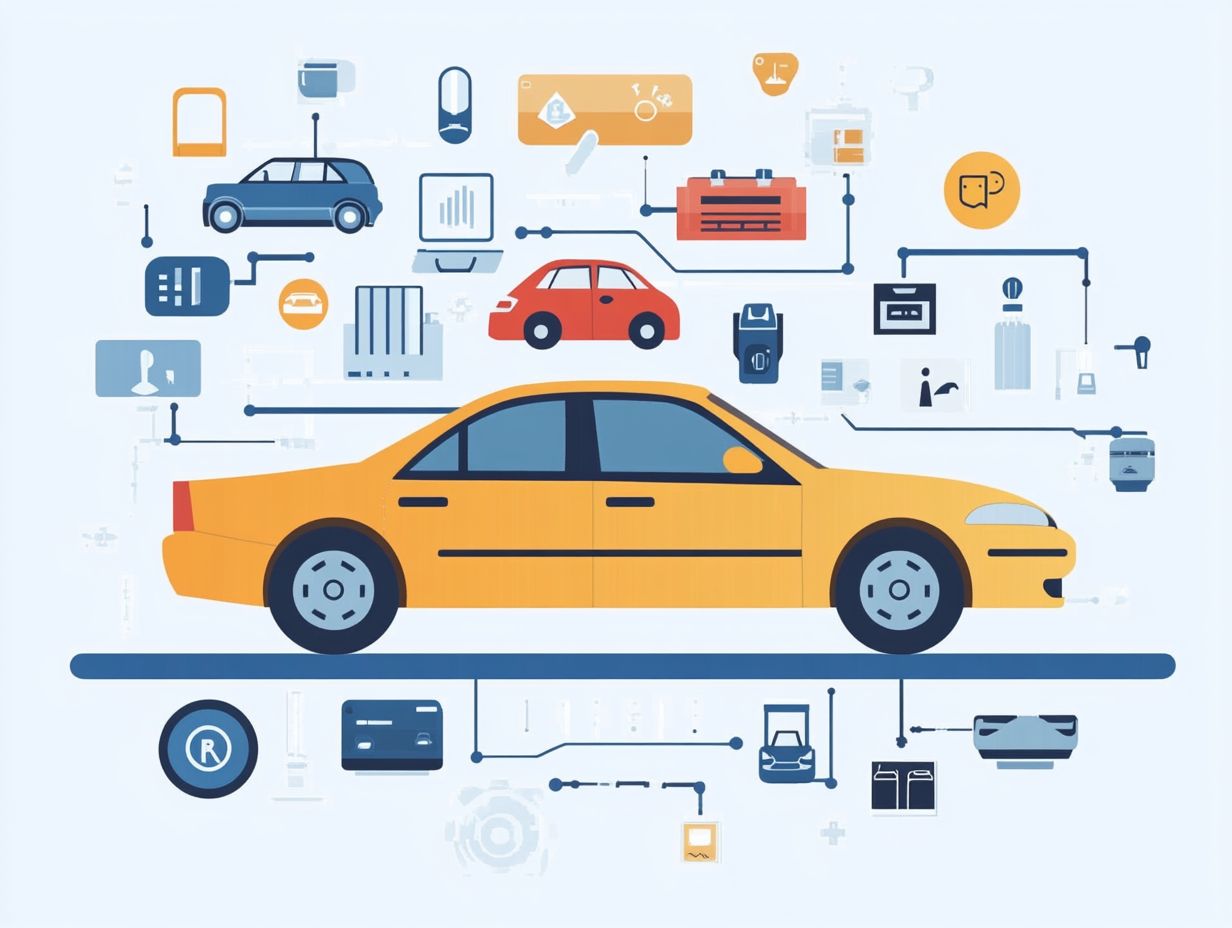
Several factors influence insurance and registration rates. As a car owner, it’s crucial to understand how these elements affect your overall costs.
Your credit score plays a critical role; insurers often assess your financial reliability to determine risk levels. Higher scores typically lead to lower premiums.
The type of vehicle you choose is another significant consideration. For instance, high-performance or luxury cars often come with higher rates due to increased repair and theft costs.
Your geographic location also impacts rates. Living in areas with higher crime rates or traffic accidents usually results in elevated insurance costs.
These factors interact in various ways. While a high credit score may help reduce risks associated with an expensive vehicle, residing in an urban area could still drive your costs up.
To optimize your insurance premiums, explore strategies like improving your credit score and selecting vehicles known for safety and lower repair costs.
Tips for Minimizing Total Cost of Car Ownership
To minimize the total cost of car ownership, engage in strategic planning and take proactive steps to reduce recurring expenses. Doing so enhances your financial sustainability and keeps your investment manageable.
Ways to Save on Expenses
Countless strategies can help you save on car ownership expenses, allowing you to manage your financial obligations more easily.
One essential tactic is to choose budget-friendly insurance plans that comply with state regulations while providing comprehensive coverage. Shop around for quotes and consider bundling your insurance with other policies to unlock potential discounts.
Utilizing a maintenance schedule is another smart move. Keeping your vehicle in top shape through regular check-ups can help you avoid costly repairs in the future.
Understanding your financing options, such as low-interest loans or leasing deals, can significantly lower your monthly payments. This way, you can keep your car payments manageable while freeing up funds for other priorities.
Frequently Asked Questions
What is meant by “Total Cost of Car Ownership”?
The Total Cost of Car Ownership refers to all expenses associated with owning and maintaining a car, including the purchase price, insurance, gas, maintenance, and other related costs. To make informed decisions, it’s crucial to consider understanding the trade-offs in new car purchases.
Why is it important to understand the Total Cost of Car Ownership?
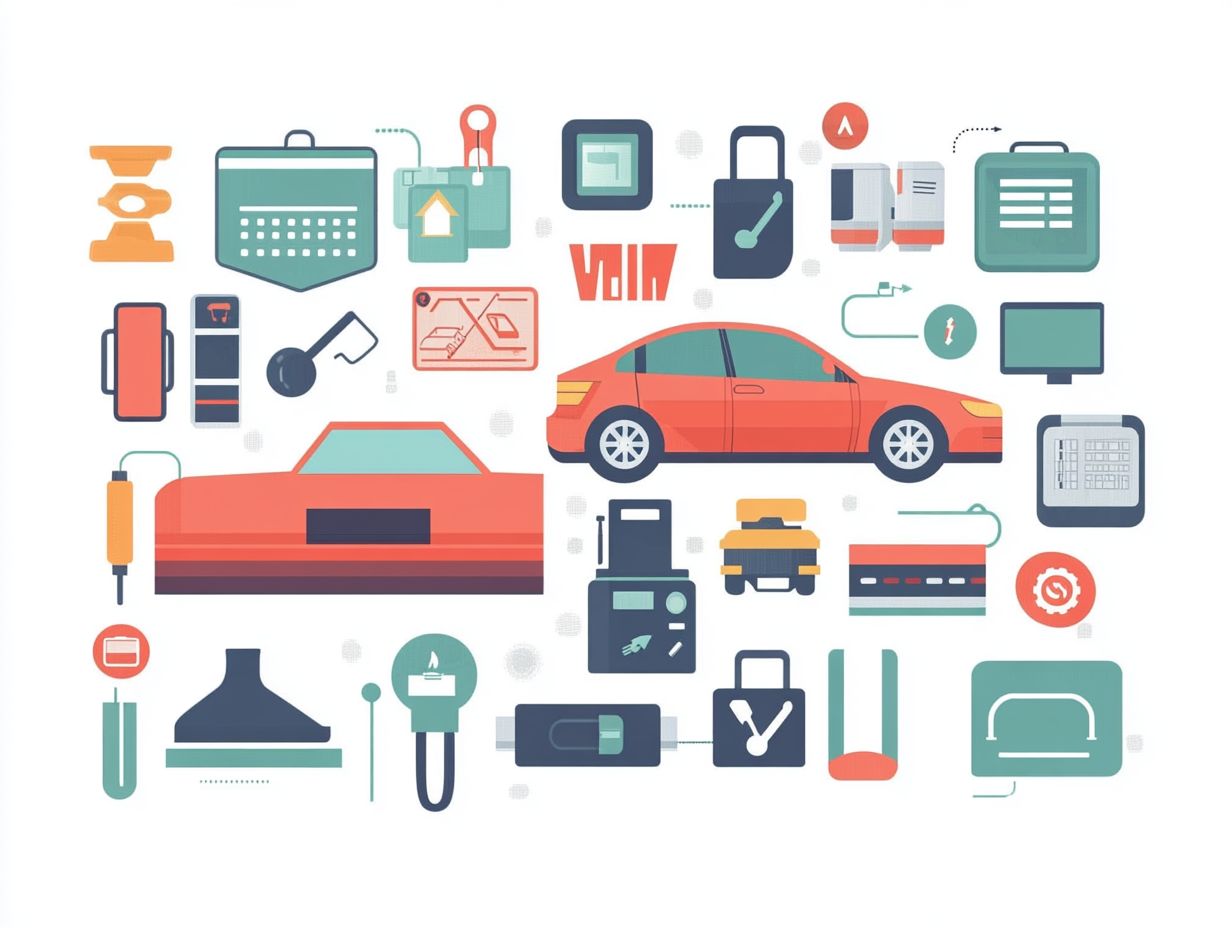
Understanding the Total Cost of Car Ownership is crucial because it gives you a realistic idea of how much you will spend on your car, helping you make informed financial decisions. For a deeper insight, refer to understanding the true cost of a new car to budget effectively.
What are some common expenses included in the Total Cost of Car Ownership?
The Total Cost of Car Ownership typically includes expenses such as car payments, insurance premiums, gas, maintenance and repairs, registration and license fees, and depreciation.
How does the type of car affect the Total Cost of Car Ownership?
The type of car can significantly impact the Total Cost of Car Ownership. For example, a luxury car will have a higher purchase price, insurance premiums, and maintenance costs compared to a basic economy car.
Can I estimate the total car ownership costs before purchasing a car?
Absolutely! Estimating your car ownership costs is easy and can save you money.
Start by researching the average costs of the make and model you’re interested in. Consider your driving habits and other related expenses, such as insurance and maintenance.
How can I lower the total car ownership costs?
You can lower the total car ownership costs in several ways. For instance, buying a used car is often cheaper than buying new.
Also, compare insurance rates from different providers. Regular maintenance can help you avoid costly repairs, and efficient driving can save you money on gas.


